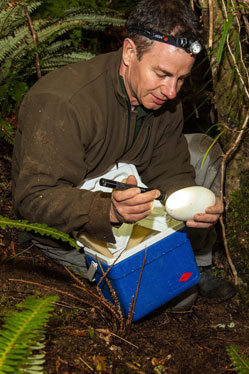A bumper first half of the 2022/2023 kiwi egg-lifting season saw a Hawke’s Bay conservation trust nearly equal the record it set last year. Kiwi lay eggs in two clutches; the Forest Lifeforce Restoration Trust sent 51 viable eggs to the National Kiwi Hatchery in Rotorua in the first half of the season, just four short of its ‘first clutch’ record.
A wet spring and summer resulted in an abundance of invertebrate life in forests across New Zealand, resulting in fit and feisty kiwi ready to produce a good number of eggs.
The egg-lifting work is part of Operation Nest Egg, the nationwide kiwi recovery initiative that removes kiwi eggs from their burrows, incubates them and cares for the chicks in captivity until they’re big enough to fend for themselves in the wild.
Traditionally, fewer eggs are retrieved in the back half of the egg-lifting season which ends in about March. But although Trust staffer and ‘kiwi whisperer’ Barry Crene doesn’t like to count his kiwi before they’re hatched he says there are signs that the second half of the 2022/2023 egg-lifting season will also be strong.
In May last year the Trust released its 500th kiwi back into the bush, an achievement described as “incredible” by Save the Kiwi executive director Michelle Impey.
“Over the past 16 years the Forest Lifeforce Restoration Trust has become one of the most prolific contributors of eggs to Operation Nest Egg,” she said. “Reaching the 500 milestone was a significant achievement both for them and for the future of the Eastern brown kiwi.”
The Trust achieved self-sustaining kiwi population levels at its property in the Maungataniwha Native Forest in 2017 and has since been using juveniles sourced as eggs from there to stock its second property, Pohokura, mid-way between Taupo and Napier. It has so far released 192 kiwi there so far and aims to release up to 200 by next year. The first, the 300th bird resulting from the trust’s conservation work, was released in 2019.
Re-establishing kiwi at Pohokura supports the long-term goal of the national Kiwi Recovery Plan; to reach 100,000 kiwi by 2030 through growing populations of all kiwi species by at least two percent a year, restoring them to their former distribution and maintaining their genetic diversity.
Eastern brown kiwi are the least managed and fastest declining of the North Island’s four regional populations. Establishing a population of around 100 pairs within five years at Pohokura will make a significant contribution towards the recovery of this species, Trust Chairman Simon Hall said.
Mr Hall said he hoped Pohokura would ultimately help re-populate neighbouring areas with kiwi.
“Just as Maungataniwha can now be the source of kiwi to re-stock Pohokura, so we hope that ultimately Pohokura kiwi will make their way naturally to neighbouring areas such as the Whirinaki Conservation Forest, which is also being made safe for them.”
Mr Hall said the Trust’s work with kiwi could not happen without the help and investment from its conservation partners, particularly the Cape Sanctuary, the National Kiwi Hatchery and its funder Ngāi Tahu, the Department of Conservation and Save The Kiwi, the only national charity dedicated to protecting the flightless national icon.
“Kiwi conservation is not just about partnerships, it’s about community,” Mr Hall said. “It’s about friends, neighbours and our volunteers banding together to protect this strange, wonderful little bird. Frequently in the dark and the cold and the pouring rain. They do it for love – literally.”
In addition to the Maungataniwha Kiwi Projectthe Trust runs a series of native flora and fauna regeneration projects. These include a drive to increase the wild-grown population of Kakabeak(Clianthus maximus), an extremely rare type of shrub, and there-establishment of native plants and foreston 4,000 hectares currently, or until recently, under pine.
Left: Forest Lifeforce Restoration Trust ‘kiwi whisperer’ Barry Crene oversaw a near-record number of viable ‘first clutch’ eggs retrieved as part of the 2022/2023 Operation Nest Egg season. | Right: Forest Lifeforce Restoration Trust Chairman Simon Hall examines a kiwi egg retrieved as part of Operation Nest egg from the Maungataniwha Native Forest. |




Comments